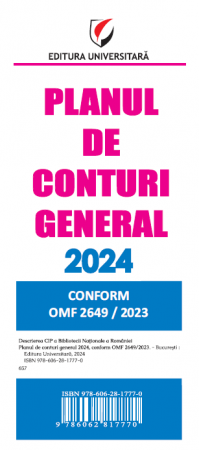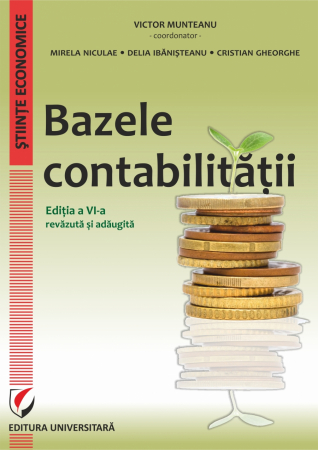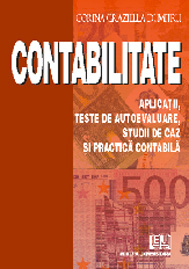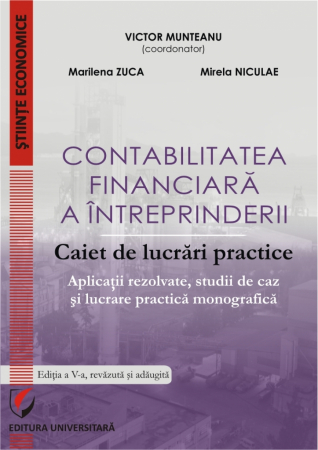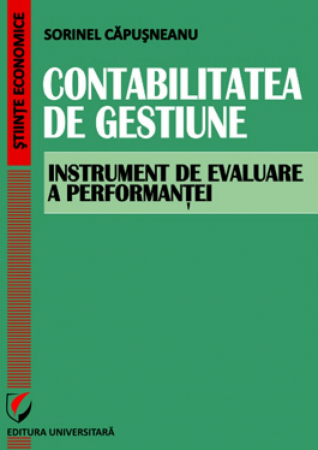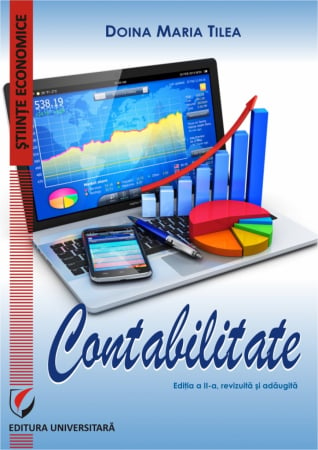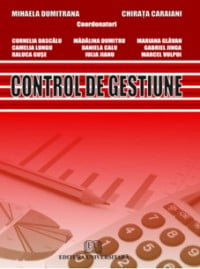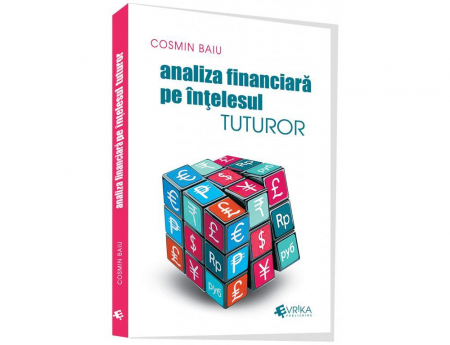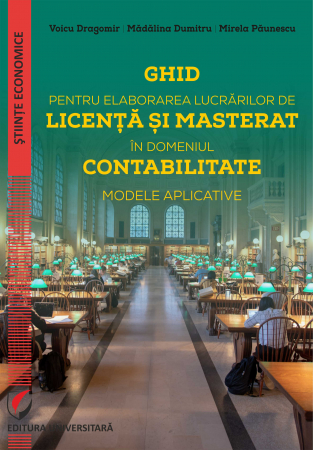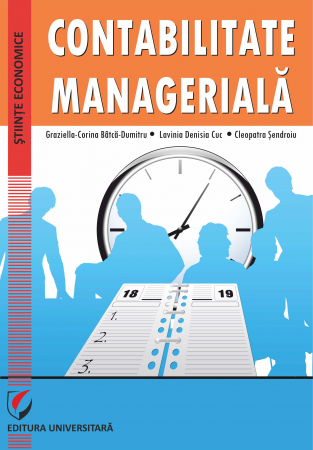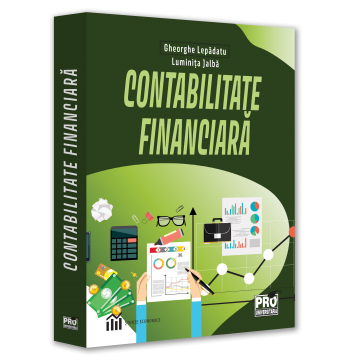6359.png) Basis of Accounting. Practical Works (Aaccounting Logic Exercises and Monographic Work). 6th edition revised and added
Basis of Accounting. Practical Works (Aaccounting Logic Exercises and Monographic Work). 6th edition revised and added
6359.png)
ISBN: 978-606-28-1045-0
DOI: https://doi.org/10.5682/9786062810450
Publisher year: 2020
Edition: VI, revizuita si adaugita
Pages: 220
Publisher: Editura Universitară
Author: Victor Munteanu - Coordonator
- Description
- Download (1)
- Authors
- Content
- More details
- Reviews (0)
What makes our message special?
At the level of the first year of study, we propose not to overcode the approach and not to abuse the technical status of accounting. We would like the student to see a different image of accounting than that of a technique for managing resources, rights and related obligations. Accounting actually means a bridge between the past and the future, an ally in any business decision-making process, but also a real lawyer in possible disputes with business partners or any other person interested in information about an entity.
We want to emphasize, beyond the traditional concept of patrimoniality, the approach on flows, on the delimitations in time and space that the keeping of an accounting generates. A practical exercise book cannot neglect a simple reality: the life of an entity which means operations and other events that must be recorded through the system of accounts. The assimilation of knowledge related to the account must start from the concepts of "uses" and "resources", and the recording of accounting operations must be subordinated to the need to reflect the three major cycles of an entity's activity: operating, investing and financing.
We consider that at the level of the first year of study of accounting, the student should not be dependent on the inclusion of this discipline in the rigid scheme of an chart of accounts (necessary tool, but which can be valued in the second year of study).
The other chapters refer to: users of accounting information, noting the dualistic nature of accounting utility; detailing the representation of the entity through the images suggested by the financial statements; recourse to documents to justify accounting records; involvement of calculations in accounting, especially when establishing the basis for measuring assets and determining results.
-
Basis of Accounting. Practical Works (Aaccounting Logic Exercises and Monographic Work). 6th edition revised and added
Download
MIRELA NICULAE
DELIA IBANISTEANU
CRISTIAN GHEORGHE
PART I - ACCOUNTING LOGIC EXERCISES
Chapter 1 - Accounting - historical evolution, definition / 9
Chapter 2 - Accounting - component of the financial-accounting information system / 11
Chapter 3 - Object and method of accounting / 22
Chapter 4 - Basic models regarding the situation of the patrimony (assets, debts and own capitals) and of the obtained results / 39
Chapter 5 - Account theory and model. Accounting mechanism: Analysis, registration and control of transactions in accounts / 61
Chapter 6 - Accounting documents / 77
Chapter 7 - Evaluation and recognition of the elements from the financial statements / 107
PART II - ROLE, ECONOMIC CONTENT, ANALYSIS AND FUNCTIONING OF ACCOUNTS
Chapter 1 - The role, economic content, analysis and operation of capital accounts, provisions, loans and similar debts. Transactions / 114
Chapter 2 - The role, economic content, analysis and operation of fixed assets accounts. Transactions / 119
Chapter 3 - The role of economic content, analysis and operation of stocks and production accounts in execution. Transactions / 121
Chapter 4 - The role, economic content, analysis and operation of third party accounts. Transactions / 124
Chapter 5 - The role, economic content, analysis and operation of treasury accounts. Transactions / 128
Chapter 6 - The role, economic content, analysis and operation of expense, income and results accounts. Transactions / 131
PART III - PRACTICAL MONOGRAPHIC WORK
Monographic practical work / 134
General Chart of Accounts / 202
Bibliography / 217
first, the desire to make available to first year students, a coherent set of applications, solved and unresolved, which would allow them a better consolidation of the knowledge acquired in the discipline "Basics of accounting". We also believe that students need to be more involved in their training by detaching themselves from the course notes that they need to see only as a starting point and that's it.
the second, the attempt to concretize our didactic activity carried out at seminars through a written material.
Elaborated in accordance with the Discipline Sheet “Basics of Accounting” and having as main source of inspiration the manual “Basics of Accounting” 6th edition 2020, revised and added, this notebook is presented in the form of a triptych in whose content are found of theoretical elements, solved applications and applications proposed for solving in the seminars. It also offers the possibility of conducting a self-assessment through a set of grid tests designed at the level of each chapter.
What makes our message special?
At the level of the first year of study, we propose not to overcode the approach and not to abuse the technical status of accounting. We would like the student to see a different image of accounting than that of a technique for managing resources, rights and related obligations. Accounting actually means a bridge between the past and the future, an ally in any business decision-making process, but also a real lawyer in possible disputes with business partners or any other person interested in information about an entity.
We want to emphasize, beyond the traditional concept of patrimoniality, the approach on flows, on the delimitations in time and space that the keeping of an accounting generates. A practical exercise book cannot neglect a simple reality: the life of an entity which means operations and other events that must be recorded through the system of accounts. The assimilation of knowledge related to the account must start from the concepts of "uses" and "resources", and the recording of accounting operations must be subordinated to the need to reflect the three major cycles of an entity's activity: operating, investing and financing.
We consider that at the level of the first year of study of accounting, the student should not be dependent on the inclusion of this discipline in the rigid scheme of an chart of accounts (necessary tool, but which can be valued in the second year of study).
The other chapters refer to: users of accounting information, noting the dualistic nature of accounting utility; detailing the representation of the entity through the images suggested by the financial statements; recourse to documents to justify accounting records; involvement of calculations in accounting, especially when establishing the basis for measuring assets and determining results.
In order to know concretely the way of drawing up the accounting works, it is required to elaborate a monograph.
With the explicit desire to give a new expression to the message that the accounting professor must convey to students, the authors are aware of the perfectibility of this practical workbook. It is also the reason why we look forward to any suggestions from our colleagues for a possible reissue, expressing our gratitude in this regard.
January 2020
The Authors

![Basis of Accounting. Practical Works (Aaccounting Logic Exercises and Monographic Work). 6th edition revised and added [1] Basis of Accounting. Practical Works (Aaccounting Logic Exercises and Monographic Work). 6th edition revised and added [1]](https://gomagcdn.ro/domains/editurauniversitara.ro/files/product/large/bazele-contabilitatii-lucrari-practice-exercitii-de-logica-contabila-si-lucrare-monografica-editia-a-vi-a-revazuta-si-adaugita-62-60298.jpg)
